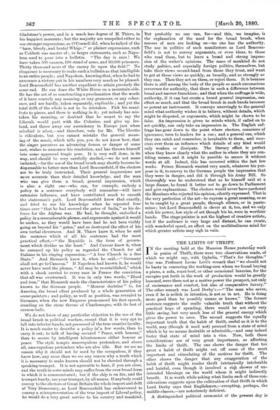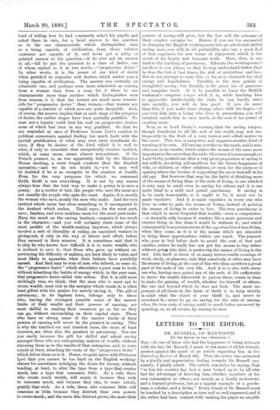THE LIMITS OF THRIFT.
TN the meeting held at the Mansion House yesterd-ay week in praise of Thrift, there were two observations -made, of which we might say, with Ophelia, "That's for thoughts." One was Professor Leone Levi's remark that "we should not be hasty in censuring the working-men whom we found buying a piano, a sofa, roast-beef, or other occasional luxuries, for the energies put forth in the work of production would be greatly lessened, were there not as a motive-power the prospect, not only of sustenance and comfort, but also of comparative luxury!' The other remark was Lord Derby's :—" The man who saves, even if he is selfish in intention, is not so in act. He is doing more good. than he possibly means or knows." The former sentence suggests the really valuable truth that without the practical hope of spending, there would be not only very little saving, but very much lees of the general energy which gives the power to save. The second suggests the equally important truth that the habit of thrift, useful as it is to the world, may (though it need not) proceed from a state of mind which is by no means desirable or admirable,—and may indeed foster that state of mind into a vice. Now, both these considerations are of very great importance, as affecting the limits of thrift. The one shows the danger that too great a habit of thrift might cut off some of the most important and stimulating of the motives for thrift. The other shows the danger that any exaggeration of the habit of thrift might render thrift intrinsically intolerable and hateful, even though it involved a riedi shower of un- intended blessings on the world whom it might indirectly benefit. It is worth while asking what limits each of these con- siderations suggests upon the cultivation of that thrift in which Lord Derby says that Englishmen,—excepting, perhaps, the middle-classes,—are notoriously deficient.
A distinguished political economist of the present day is
fond of telling how he had constantly asked his pupils, and asked them in vain, for a brief answer to the question as to the one characteristic which distinguishes man as a being capable of civilisation, from those inferior creatures not capable of it, and never got a pithy or pointed answer to his question,—if he ever got an answer at all,—till he put the question to a class of ladies, one of whom replied to it in two words,—" progressive desire." In other words, it is the power of one kind of desire when gratified to engender new desires, which makes man a being capable of civilisation. The answer was certainly an admirable one, and perhaps even more admirable as coming from a woman than from a man, for if there be one characteristic more than another which distinguishes men from women, it is that the former are much more remark- able for "progressive desire" than women,—that women are capable of a content of which men are quite incapable. And, of course, the answer implies that at each stage of the progress of desire, the earlier stages have been partially gratified. No man not a lunatic could feed his soul on progressive desires none of which had, been in any way gratified. So that we are rerainded at once of Professor Leone Levi's caution to political economists against finding too much fault with the partial gratification of what may even seem inordinate de- sires, if they be desires of the kind which it is well to whet, if only to stimulate that energetically creative instinct, which, in some races, seems almost non-existent. If the French peasant is, as was apparently held. by the Mansion House meeting, a, more frugal creature than the English operative,—and we do not doubt it,—yet it may well be doubted if he is as energetic in the creation of wealth. Even for the very purposes for which we commend thrift, thrift is not everything. It is not by any means always true that the best way to make a penny is to save a penny. As a matter of fact, the people who save the most are not usually the people who gain the most. Again, it is mostly the women who save, mostly the men who make. And the very instinct which saves has often something in it uncongenial to the instinct which makes. Timid races, for the most part, save ; fearless, and even reckless, races for the most part make. Harp too much on the saving instinct,—engrain it too much in the character,—and. you will certainly stunt some of the most prolific of the wealth-making impulses, which always involve a sort of liberality of outlay, an unstinted venture in giving-out, if only in the way of labour and effort, before they succeed in their mission. It is sometimes said that it is only he who knows how difficult it is to make wealth, who is inclined to save it ; that those who grow up without ex- periencing the difficulty of making, are least likely to value, and most likely, to squander, what their fathers have painfully earned. And that.may be true of men who inherit, as some do, the " progressive,desire " which stimulates a poor man to work, without inheriting the habits of energy which, in the poor man, that progressive clesire,called into action. But it is still more strikingly true, we think, that the man who is most apt to create wealth, most rich in the energies which create it, is often least gifted with the genius, for merely saving it. The gift of parsimony, in its highest form, belongs only to those who, having the strongest possible sense of the narrow limits of their wealth and their powers of earning, are most skilful in making their resources go as far as they can go, without encroaching on their capital store. Those who have no strong sense of the narrow limits of their powers of earning will never be the greatest in saving. This is why the timidest sex and timidest races, the races of least resource, are often also the greatest in parsimony. Nor can you easily increase the gift for skilful and adroit saving amongst those who are enterprising makers of wealth, without alarming them as to the results of that enterprise, and, to some extent at least, attacking the roots of the "progressive desire" which drives them on to it. Hence, we quite agree with Professor Levi that you cannot be too hard on the English working- classes for sometimes indulging the desire for luxury, without tending, at least, to alter the type from a type that creates much,, into a type that consumes little. As a rule, those who create much wealth, will create it because they wish to consume much, and because they can, to some extent, gratify that wish. As a rule, those who consume little will consume so little because they distrust their own powers to create mach; and the more this distrust grows, the more their
powers of saving will grow, but the less will the outcome of their creative energies be. Hence, if you are too successful in changing the English working-man into an adroit and skilful saving man, you will, in all probability, also sap a good deal of that eagerness for new forms of enjoyment which is the secret of his hearty and buoyant work. Here, then, is one limit to the teaching of parsimony. Educate the working-man's intellect, if you please, so that he may understand better than he does the risk of bad times, the risk of misfortune and loss. But do not attempt to carry this so far as to diminish his vital energy and hopefulness. Timidity is the true genius of thoughtful saving ; but timidity is the great foe of generous and sanguine work. If it be possible to leave the British workman's sanguine temper what it is, while teaching him to appreciate intellectually the risks he can hardly enter into morally, you will do him good. If you do more than this, if you make fears change place with his hopes,—if you turn him into a being who lives in precautions, you will certainly enable him to save much, at the cost of his power of creating more.
Next, as to Lord Derby's warning that the saving temper, though beneficent to all the rest of the world, may not 'in- frequently be the fruit of a very narrow and selfish motive in the saver. This, too, is most true, and suggests another kind of warning of its own. All-saving overshoots the mark, and is mis- chievous in its results, which makes the means of life seem more important to the saver than the ends. Of course it is true enough, as Lord Derby pointed out, that a very great proportion of saving is not selfish, involving self-sacrifices for the future happiness of wife, or children, or other relatives, or even for the purpose of sparing others the burden of supporting the saver himself in his old age. But however that may be, the habit of thinking more of the means of living than of the ends of living, is one which it is very easy to catch even in saving for others, and it is one quite fatal to a mild and genial parsimony. If saving is to be made honourable, as it ought to be, it must not be made repulsive. And it is made repulsive in every one who lives in order to gain the means of living, instead of gaining the means of living in order to live. The true parsimony is that which is never forgetful that wealth,—even a competence, —is desirable only because it renders life a more generous and sweeter thing to live than it would be without it ; and which consequently is as parsimonious of the opportunities of true living, when they come, as it is of the means which are intended to bring those opportunities within our reach. The peasant who goes to bed before dark to avoid the cost of fuel and. candles, unless he really has not got the means to buy either without going into debt, is preferring the means of living tothe end. Life itself is shorn of so many irrecov erable evenings of work, study, or pleasure, only that somebody or other may have the means of living, at the cost of him who thus sacrifices .a great part of the ends of his own life. And it is so also with every one who, having once prized any of the ends of life sufficiently to desire the wealth wherewith to pursue them, comes in time to make the gaining of wealth, whether for himself or others, the one end beyond which he does not look. The most im- portant of all limits to the habit of thrift is to keep strictly.
in mind what the object of your thrift is, and never to overshoot it,—never to go on saving for the sake of saving, when the true ends of saving could be much better answered by spending, or, at all events, by ceasing to save.



































 Previous page
Previous page